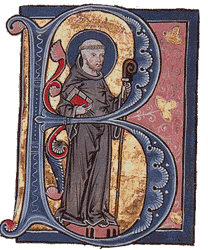 rother Cadfael is a fictional Benedictine monk created by the author Ellis Peters who served as a Herbalist at Shrewsbury Abbey in 12th century England. Against the historical backdrop of "The Anarchy" - a civil war between King Stephen and the Empress Maude - Cadfael operated as a detective who solved many murders.
rother Cadfael is a fictional Benedictine monk created by the author Ellis Peters who served as a Herbalist at Shrewsbury Abbey in 12th century England. Against the historical backdrop of "The Anarchy" - a civil war between King Stephen and the Empress Maude - Cadfael operated as a detective who solved many murders.
I've been watching the TV adaptations in which Cadfael is played by Derek Jacobi. He, as always, is superb and matched by an excellent supporting cast of regulars and guests. The locations and sets are suitably authentic and, as far as my limited knowledge permits me to judge, it doesn't skimp on historical accuracy. Although the basic structure is classic "whodunnit", there is a unique atmosphere created by aspects unfamiliar to a modern audience: the austere life of monks; the power tensions of lords, church and king; the brutality and lack of modern law-keeping and justice.
Cadfael is portrayed as being both devout and pragmatic in his application of his religious rule and teachings. Before becoming a monk he was a soldier in the crusades, and he has retained his skill sufficiently to defend himself and vulnerable others. But it his knowledge of the real world and everyday people that sets him apart from other monks. Many monks began their vocation before they had become adults and are completely ignorant of the outside world. Cadfael is often mistaken by others as being such a monk, which allows him to move unregarded and extract information with apparently innocent questioning.
Some aspects of the stories are familiar. The motives of the murderers are various combinations of love, lust and greed. And it's interesting to see that humans almost a millennium ago were much the same as we are now, even though they don't have cars, electricity or even metal spoons. Cadfael's ally, Lord Hugh Berringer, the under-sheriff, provides extra muscle and sword-power on many occasions. What makes these stories immediate and engaging is that we see the plot evolve from the perspective of Cadfael and Berringer - the goodies - who are in fact characters with contemporary values of justice and fairness: Cadfael the detective, and Berringer the policeman.
There's something very appealing about monastic life to me. The simplicity of it; the lack of choice; the order. But I wouldn't last a day as a monk, as I'm utterly unable to conform and have no religious belief at all. So why does it appeal? Probably because it is the antithesis of my current existence and a part of me yearns for such simplicity and order.
There is one aspect of monastic life from which we might benefit: the drive to do deeds for their own sake, or for the sake of others' or for some greater purpose, and not simply for selfish reasons. Fulfillment in life does not come from sitting around relaxing or spoiling yourself with material luxuries, but from hard work and mental discipline. Thankfully, my sense of fulfillment doesn't involve solving murders in 12th century England.